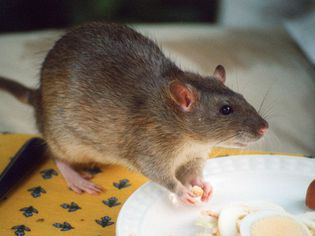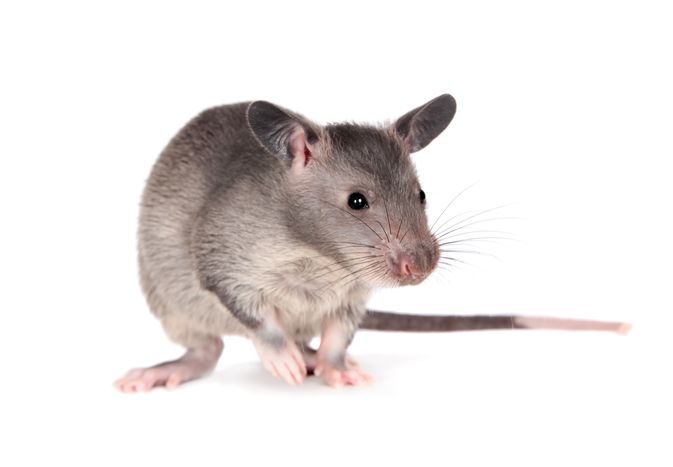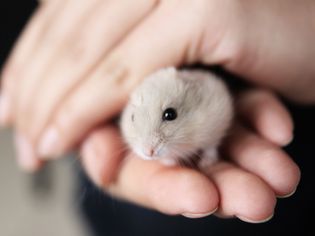Ferret Lymphoma
Ferret lymphoma (also referred to as lymphosarcoma) is an awful kind of cancer that is commonly seen in pet ferrets. It affects any and all lymphoid tissue and can spread throughout the entire body. It can also be difficult to diagnose and unfortunately, no cures currently exist.
What Is Lymphoma?
Lymphoma in ferrets is the same thing as it is in dogs, cats, and other animals. It is cancer that affects lymphoid tissue and depending on the area it is affecting, it is classified as multicentric, mediastinal, gastrointestinal, cutaneous and extranodal. It is also classified as either low grade or high.
Multicentric lymphoma is when the lymph nodes are affected and they are usually obviously enlarged. The liver, spleen and bone marrow may also be affected. Mediastinal lymphoma affects the lymph nodes in the thorax (chest) and may also affect the thymus gland. Gastrointestinal lymphoma, as the name implies, is found in the stomach and intestinal tract and may also affect other organs. Extranodal lymphoma can affect the skin, eye, heart, kidneys, or central nervous system.
Symptoms of Lymphoma
Since lymphoma can be found almost anywhere in your ferret's body it can be hard to diagnose. Your ferret might present with weakness, diarrhea, lethargy, vomiting, bloody stools, enlarged lymph nodes, itchy and inflamed areas of the skin, or even bleeding within an eye. With so many possible symptoms in so many different areas of the body, the disease is often treated symptomatically before a confirmed diagnosis is made.
Bloodwork or cytology and biopsies of obviously affected areas of skin or visible lymph nodes will aid in a positive diagnosis. Increased calcium and low albumin levels in the bloodwork may reveal lymphoma, along with tumors identified through radiographs or ultrasounds. Often times a ferret is chronically ill and elective surgery is performed to explore the abdomen for possible abnormalities. This surgery usually finds some sort of lymphoma and/or other common ferret diseases such as adrenal disease or an insulinoma.
If a biopsy of an affected lymph node is taken and is found to be positive for lymphoma, it will be assigned one of five stages. Stage five is the worst stage where the bone marrow or blood is involved in the disease process.
Treating Lymphoma in Ferrets
Curing lymphoma is unfortunately not very likely. While chemotherapy is available, it usually only buys you a very limited amount of extra time. Oral steroids, such as prednisolone, are administered to help with the size of the tumors and typically some improvement is noted short term, but overall a very poor long-term prognosis (outcome) is expected.
Treating lymphoma with steroids and symptomatically if your ferret has diarrhea, vomits, or a skin infection, are usually the options most ferret owners take. But intravenous (IV) chemotherapy drugs are available to the owner who wants to do all they can for their ferret.
Causes of Lymphoma
Lymphoma seems to be seen more and more often in vet clinics lately. While no one knows for sure what causes the many kinds of lymphoma, some are recently speculating it has something to do with a virus. Lymphoma has even been given from an infected ferret to a previously non-infected ferret with "cell-free extracts" in a laboratory but to date, no genes have been isolated, therefore we don't know exactly what causes it.
As of now, there is nothing you can effectively do to limit the chances that your pet ferret will get lymphoma. But hopefully, one day that will change.
If your ferret has any symptoms of lymphoma, such as diarrhea, lethargy, or weight loss, or you suspect he has another common ferret disease make sure you get him checked out by your exotics vet as soon as possible.
RECOMMENDED NEWS

Worms or Parasites That Can Get Your Reptile Sick
Reptiles, like horses or other pets, may have worms or intestinal parasites that may not cause any ...
Read More →
Should You Keep a Pet Monkey?
Taking on a pet monkey is not like caring for most other pets. A well-cared-for monkey can generall...
Read More →
Feeding Pet Rats
Feeding pet rats is not difficult, but there are some important items to include when doing so. Spe...
Read More →
How to Care for a Pet Gambian Pouched Rat
The Gambian pouched rat is a large rodent that’s native to Sub-Saharan Africa. The U.S. has banne...
Read More →
Circling in Hamsters
Hamsters are very active so it is normal to see them running around their cages and on their exerci...
Read More →
Can Hamsters Eat Cheese?
Cheese has been associated with rodents for ages, and cartoons have a lot to do with this. Do roden...
Read More →
Why Do Hamsters Sometimes Eat Their Babies?
Did you know hamsters sometimes eat their babies? Hamsters are known to be cute, pint-sized pets th...
Read More →
Reasons Why Rabbits Eat Their Own Poop
Rabbits, much like cats, are fastidious groomers and practice very good hygiene. They are often see...
Read More →
How to Care for a Pet French Lop Rabbit
French lop rabbits were bred from English lops and giant papillons (also known as checkered giants)...
Read More →
Comments on "Ferret Lymphoma" :